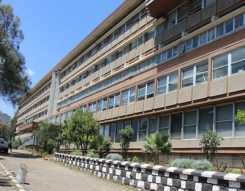Thinking Design Training on the 10 October 2015:
Models and Methods for Patient Centered & Student Centered Practices
For Healthcare Professionals, Medical Educators and Medical Students
 St Paul’s Hospital and St. Paul’s Millennium Medical College
St Paul’s Hospital and St. Paul’s Millennium Medical College
Addis Ababa, Ethiopia
October 10, 2015 • Saturday: Training for Key Decision Makers and Leaders including key hospital administrators, hospital doctors, hospital professional staff, hospital support staff, medical college faculty and students.
Robert Seth Price and Seble Hailu (more information below) will be co-facilitating the training.
Connecting Healthcare and Education:
Thinking Schools and Thinking Design = Life Long Problem Solving Skills
The connection is simple. Life long thinking skills support problem solving all areas of life including with the key areas of health, education, shelter and community. Thinking Design and Thinking Schools Ethiopia methodologies are life long practical problem solving skills. As important with a child’s mindful development as with making thoughtful decisions in healthcare.
“No one is born fully-formed: it is through self-experience
in the world that we become what we are.”
― Paulo Freire
 Introduction and Background
Introduction and Background
Thinking Design is a systems approach that uses practical research based methods to assure a healthy organization that supports and grows effective communication with and between leadership and the whole organization. It uses tools that thoughtfully and effectively communicate ideas within and outside organization to create collaborations. It honors and understands the abilities and gifts of all members of an organization.
Thinking Design training uses the Thinking Design research based methods that include:
- Visual Tools (Thinking Maps): the use of visual tools to map out ideas;
- Questioning for Inquiry: high quality use of questions and shared inquiry;
- Collaborative Networking: collaborative thinking; collegial coaching and
community building methods; - Developing Dispositions: characteristics, dispositions, habits of mind;
- Designing a Thinking Environment: how the physical space, human interaction
and resources are organized, integrated and used.
 To live fulfilling lives, people will need to develop the knowledge, skills and dispositions required to shape the lives they can imagine for themselves and their families. The thinking tools are instrumental in knowing oneself, connecting with others, and exploring pathways of successful collaborations supporting a healthy and success organization. Thinking Design methods are lifelong thinking and learning skills used for problem solving individually and collaboratively in the whole organization including leaders, professional and staff members.
To live fulfilling lives, people will need to develop the knowledge, skills and dispositions required to shape the lives they can imagine for themselves and their families. The thinking tools are instrumental in knowing oneself, connecting with others, and exploring pathways of successful collaborations supporting a healthy and success organization. Thinking Design methods are lifelong thinking and learning skills used for problem solving individually and collaboratively in the whole organization including leaders, professional and staff members.
Thinking: The Most Important Human Resource
for Life Long Visioning, Problem Solving, and Decision Making
The training has multiple sequential stages:
Hands-on training for learning, practice for mastery, and mastery.
Learning Outcomes
The Thinking Design approach is recommended for the whole organization including the organizations leadership, teaching faculty, professional staff, support staff, students, and volunteers. The Thinking Design model are life long tools and skills for communication, understanding each other’s perspecitve, problem solving and a quality collaborative learning environment. The Thinking Design approach is concurrently student centered (medical college) and patient centered (hospital professional and support staff) that promotes active thinkers and problem solvers.
Training Outcomes
The Thinking Designs trainers will build understanding, mastery and capacity within the hospital and medical college with the methods of thinking. This will include:
- personal mastery
- building a shared vision
- team learning
- developing mental models
- creating a systems thinking organization

The outcomes will be assessed by The Five Areas for Reflection and Fifteen Criteria Thinking Organizations Assessment Process.
To learn more about the training please contact either of the co-trainers below and/or read the training guide. Download the training guide PDF.
Consultants
Robert Seth Price has extensive experience with whole organization (NGOs, universities, foundations) and school change through a transformational design process. Simply, how can we collaboratively and thoughtfully affect learning outcomes as a process for our whole community, our vision, and individually. His work with a participant learner centered systems approach includes collaborations in the USA and globally, including with Thinking Foundation, Thinking Schools International and Thinking Schools Ethiopia. Further information on Robert can be found at his website www.eggplant.org
email: robert@eggplant.org
Skype: robertsethprice
Viber: +1 323.397.0630
USA Mobile: 323.397.0630
Seble Hailu has worked in government, private, non –government and UN organizations in different managerial positions leading project and program management for nearly twenty years throughout Ethiopia. In addition, she has extensive experiences in training and consultancy, in management, HIV/AIDS, psychology, counseling, education and community mobilization related fields.
More about Seble Hailu
email: seble.hailu@gmail.com
Ethiopia Phone: 0911-6060055
